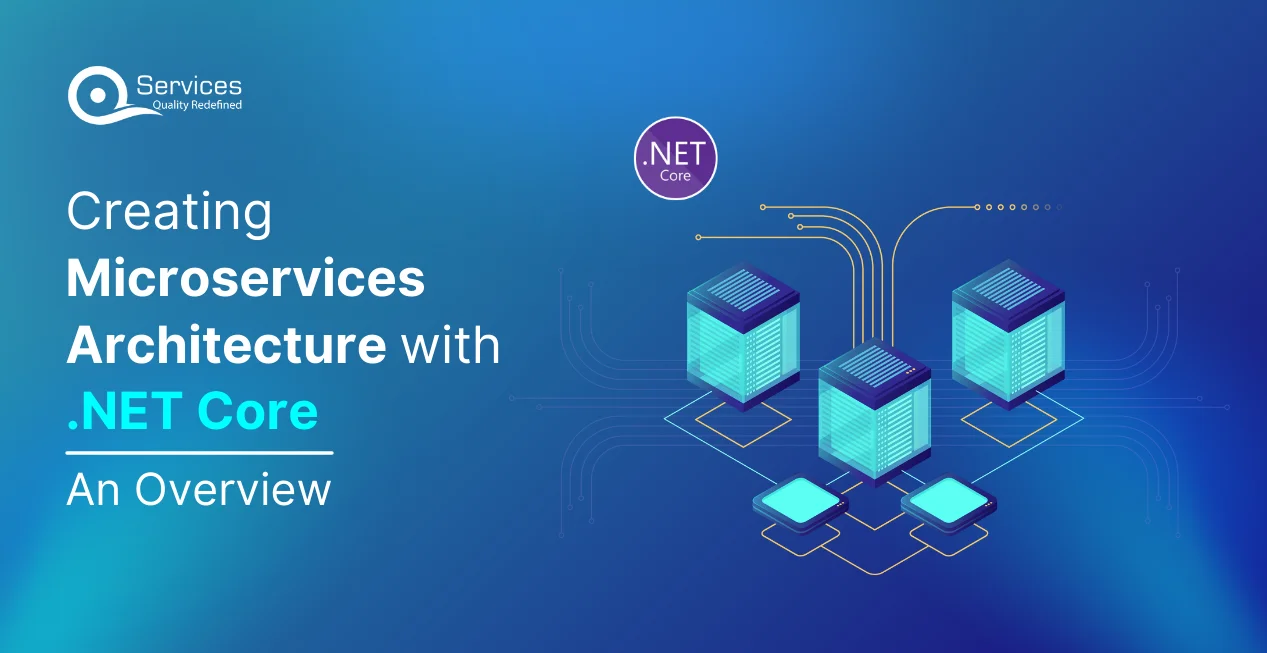
Rewards
.





CANADA
55 Village Center Place, Suite 307 Bldg 4287,
Mississauga ON L4Z 1V9, Canada
Certified Members:
.



Home » The Impact of Cloud Computing on .NET Development

Cloud computing has revolutionized software development by offering flexible, on-demand resources and reducing the need for costly infrastructure. This enables developers to quickly deploy and update applications.
When integrated with .NET development, cloud computing has dramatically transformed the software industry. It provides elastic scalability, faster deployment, cost savings, global reach, and robust security. A recent study found that 78% of organizations have adopted cloud services for their .NET applications, citing improved agility and cost efficiency. In this article, we’ll explore how cloud computing has impacted software development, with a particular focus on leveraging cloud computing for .NET development
In today’s complex data landscape, seamless integration is no longer just a nice-to-have—it’s essential. Microsoft’s .NET framework stands out as a crucial tool for integration within hybrid cloud environments, and here’s why:
Cross-Platform Agility: With .NET Core, developers can easily build and deploy applications in the cloud across various platforms. Whether it’s for web, mobile, desktop, gaming, or IoT, .NET offers a unified platform that supports multiple languages and libraries.
Scalability and Versatility: .NET is adept at handling large-scale, data-heavy applications. Its compatibility with different databases adds versatility and supports a range of programming languages, making it adaptable for diverse use cases.
Azure Integration: Microsoft Azure, a top-notch cloud computing platform supports .NET applications effortlessly. Organizations can easily utilize Azure services to deploy, scale, and manage .NET applications in the cloud.
Get free Consultation and let us know your project idea to turn into an amazing digital product.
Microsoft Azure is a comprehensive cloud platform renowned for its extensive array of over 200 products and services accessible over the internet. It stands out for its robust developer tools, stringent security measures, and broad compliance coverage, earning trust from 95% of Fortune 500 companies globally. Azure categorizes its services into distinct areas, including computing, mobile, web, storage, analytics, networking, and more, each offering specialized tools and features to meet diverse business needs.
Within the offerings of the Azure cloud computing platform, developers can find solutions for building and deploying applications across various platforms, managing large-scale data-intensive tasks, securing sensitive information, and infusing AI and machine learning capabilities into their projects. Additionally, Azure provides tools for seamless integration, efficient migration from on-premises environments, and comprehensive management and governance of cloud resources.
The introduction of cloud computing has greatly influenced the advancement of .NET development.
The evolution of.NET development, from pre- to post-cloud adoption, has significantly advanced with the widespread embrace of cloud-native practices. With over 6.8 million cloud-native developers globally and approximately 2.7 million utilizing Kubernetes, the.NET ecosystem has undergone a transformative shift. Traditionally, development was centered around monolithic applications, limiting scalability and flexibility. However, the integration of cloud-native architectures, along with cloud development services, has reshaped this approach, enabling the adoption of microservice architectures and containerization technologies. This shift empowers developers to build and deploy.NET applications with enhanced scalability, resilience, and efficiency, driving the industry towards a future of agile and innovative software development practices.
Cloud computing offers several benefits for .NET development, particularly when utilizing platforms like Microsoft Azure. Here are six key advantages:
Cloud platforms enable swift deployment of test environments, requiring mere minutes to connect necessary resources. This agility contrasts with the lengthy process of acquiring and setting up dedicated hardware, making it easier for developers and testers to initiate projects swiftly.
Cloud providers offer robust security measures that surpass what many companies can achieve with on-premises data centers. This level of security, combined with reliable computing and engineering equipment, ensures the continuous availability of resources and safeguards data against potential losses.
Azure provides various tools and functionalities, including Azure App Service, Azure SQL Database, Azure Functions, and more. These services are tailored to meet various application requirements, enabling .NET developers to create robust and scalable solutions. Essentially, Azure’s rich service ecosystem equips developers with the essential resources and capabilities needed to efficiently build and deploy applications, without the need to develop or manage these services from scratch.
Cloud providers deploy cutting-edge security protocols that often surpass what many companies can achieve with on-premises data centers. This elevated level of security, combined with dependable computing and engineering equipment, ensures uninterrupted access to resources and fortifies defenses against potential data breaches.
Cloud computing provides cost-effective solutions for businesses. Instead of making large initial investments in purchasing hardware, companies can use cloud services on a pay-as-you-go basis. This means they only pay for the resources they use, leading to significant cost savings. Additionally, by avoiding the need to maintain underutilized hardware, businesses can alleviate the financial burden by owning and managing physical infrastructure.
Cloud platforms offer dependable stability and scalability, crucial for accommodating fluctuating workloads and sustaining optimal performance levels. Conducting load testing in the cloud ensures uninterrupted operations and smooth application performance, even during periods of peak usage.bb
Azure offers a range of services tailored to empower .NET developers throughout the application lifecycle:
Azure App Service is a managed platform designed for swiftly building, deploying, and scaling web applications, supporting various programming languages.
Features: With Azure App Service, developers can effortlessly host web applications, APIs, and mobile backends. Its auto-scaling feature dynamically adjusts resources based on demand. Seamless integration with Visual Studio streamlines development and deployment processes. Staging slots allow for testing changes before deploying to production. Custom domains and SSL support ensure secure connections.
Use Case: Azure App Service is ideal for hosting a variety of applications, including web apps, RESTful APIs, and microservices.
Azure DevOps is a comprehensive suite of tools designed to manage the entire application lifecycle, guiding processes from planning and coding to testing and deployment.
Features: This platform includes robust CI/CD pipelines, streamlining build and release processes through automation. Additionally, it provides efficient work item tracking for managing tasks, bugs, and features. Azure Repos offers Git repositories for version control, while test plans facilitate structured testing efforts. Furthermore, artifacts enable the hosting and management of package feeds.
Use Case: Azure DevOps helps in implementing DevOps practices effectively, ensuring seamless integration, and fostering smooth development workflows.
Azure Functions enables serverless computing, allowing developers to run code in response to events without managing servers.
Features: It supports event-driven execution triggered by various events such as HTTP requests, timers, and queue messages. Azure Functions operate on a pay-as-you-go pricing model, ensuring cost-effectiveness. Seamless integration with other Azure services simplifies development tasks. Functions are stateless and automatically scale based on demand.
Use Case: Azure Functions are well-suited for implementing event-driven architectures, background processing tasks, and microservices.
These services work together, allowing .NET developers to build robust, scalable, and secure applications in the cloud.
Cloud-based development services have opened exciting new opportunities for .NET developers, completely changing how applications are built. Azure, one of the big players in this field, offers lots of tools specifically designed for .NET developers. A key player in this transformation is specialized ASP.NET development companies. They’re like pioneers, using Azure to create clever solutions for their clients.
These companies are experts in both .NET development and using Azure. They’re good at blending Azure tools into .NET applications, offering comprehensive .NET application development services. For example, they can use Azure App Service to host websites and Azure SQL Database to handle data. This lets them create complete solutions that work well together, ensuring seamless integration and functionality.
One significant thing about Azure is it can handle big changes in how many people are using an app. ASP.NET firms use this feature to build apps that can handle sudden jumps in users without crashing. They also use Azure’s built-in backup systems to make sure apps stay up and running, even if something goes wrong.
Keeping data safe is super important, especially with laws about privacy and security. ASP.NET firms make sure their apps follow all the rules. They use Azure’s security tools to encrypt data and control who can see it, making sure only the right people have access.
These firms are always looking for new ways to make their apps better. They keep up with all the latest stuff Azure offers, like using Azure Functions for small tasks or adding AI features to apps. This helps them build cutting-edge apps.

Serverless architecture is becoming popular because it’s scalable, cost-effective, and based on events. This means developers don’t have to manage servers and can focus on writing code. For .NET applications, Azure Functions allow .NET code to run without managing servers. Azure Functions automatically adjust based on demand and only charge for the time the code runs, making it a flexible and efficient choice for applications with varying loads.
Adding AI and machine learning to.NET applications is now easier with Azure AI services. Azure Cognitive Services provide ready-to-use tools that let developers add smart features to their applications without needing deep AI knowledge. This includes features like understanding and generating human language, analyzing images and videos, and making predictions based on data. By integrating AI, .NET applications become more intelligent and user-friendly, offering personalized experiences and automating complex tasks.
The shift to microservices architecture and containerization is changing how .NET applications are built. Microservices break applications into smaller, independent parts that can be developed, deployed, and scaled separately. Containers, managed by tools like Docker, package these parts with everything they need to run, ensuring they work the same in any environment. Kubernetes helps manage and scale these containers.
As development moves to the cloud, .NET developers need a broad set of skills to keep up. In addition to knowing the .NET Framework or .NET Core, they must learn cloud technologies and modern development practices.
.NET developers should have a good grasp of cloud platforms like Azure. This includes knowing core services, deployment methods, and best practices. They should be familiar with Azure DevOps for continuous integration and delivery (CI/CD), Azure Resource Manager (ARM) for managing infrastructure with code, and Azure Monitor for tracking and diagnosing application performance.
With containers becoming more popular in cloud development, .NET developers need to be skilled with tools like Docker and Kubernetes. They should know how to package .NET applications into containers and deploy them in managed environments for better scalability and portability.
Adopting DevOps and agile practices is essential for .NET developers to improve development workflows and deliver customer value efficiently. This involves close collaboration with cross-functional teams, automating repetitive tasks, and continuously seeking improvements.
Cloud computing has transformed .NET development by providing unmatched flexibility and scalability. Azure enables .NET developers to deploy faster and enhance security. Trends like serverless architecture and AI integration are redefining .NET applications. Specialized ASP.NET firms use Azure for seamless integration. To stay competitive and meet increasing demands, companies should hire .NET developers proficient in cloud technologies and agile methodologies.
Learn more and explore “How Cloud Computing Affects Small and Medium-Sized Business (SMB) Growth” which offers valuable insights. This topic discusses how cloud computing transforms SMB development by offering affordable solutions, scalability, and increased productivity. It explains how SMBs can use cloud technologies to simplify operations, reach more customers, and stay competitive in today’s digital world.

Our Articles are a precise collection of research and work done throughout our projects as well as our expert Foresight for the upcoming Changes in the IT Industry. We are a premier software and mobile application development firm, catering specifically to small and medium-sized businesses (SMBs). As a Microsoft Certified company, we offer a suite of services encompassing Software and Mobile Application Development, Microsoft Azure, Dynamics 365 CRM, and Microsoft PowerAutomate. Our team, comprising 90 skilled professionals, is dedicated to driving digital and app innovation, ensuring our clients receive top-tier, tailor-made solutions that align with their unique business needs.
![Azure vs AWS Cost Comparison Financial Services Cloud Migration Calculator [Case Study]](https://www.qservicesit.com/wp-content/uploads/2025/03/Azure-vs-AWS-Cost-Comparison-Financial-Services-Cloud-Migration-Calculator-Case-Study-.webp)
This blog breaks down the Azure vs AWS cost comparison for financial services, using real case studies to explain the cost factors.

Think of Azure Active Directory (AAD) as a digital security service for your enterprise. It’s like a smart key system that lets people (employees) access the tools and apps they need to do their jobs while keeping the bad guys (hackers) out.

Microservices have changed how we build modern software by breaking applications into smaller, independent parts. Instead of one large system, you create smaller services that focus on specific tasks. This makes it easier to update, scale, and develop faster. Microservices and .NET can resolve scalability issues and provide a strong foundation for your system during peak traffic.
Cloud computing has transformed .NET development by providing flexibility, scalability, and cost efficiency, enabling faster deployment and global reach.
Azure integrates seamlessly with .NET applications, providing tools and services that enhance deployment speed, scalability, security, and overall application performance.
These firms, like QServices, leverage Azure’s tools and services to integrate.NET applications seamlessly, ensuring scalability, reliability, security, and continuous innovation.
Skilled .NET developers, particularly those from QServices, can leverage cloud platforms like Azure to optimize application performance, scalability, and security, meeting modern business demands. Their expertise ensures that applications are built efficiently and effectively, utilizing the best practices and tools available in the cloud environment.
Microservices allow .NET applications to be more modular, scalable, and easier to maintain by breaking down functionalities into independent services.
Schedule a Customized Consultation. Shape Your Azure Roadmap with Expert Guidance and Strategies Tailored to Your Business Needs.
.





55 Village Center Place, Suite 307 Bldg 4287,
Mississauga ON L4Z 1V9, Canada
.




Founder and CEO

Chief Sales Officer

🎉 Thank you for your feedback! We appreciate it. 🙌